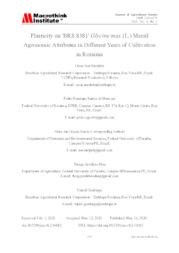Plasticity on 'BRS 8381' Glycine max (L.) Merril Agronomic Attributes in Different Years of Cultivation in Roraima.
Plasticity on 'BRS 8381' Glycine max (L.) Merril Agronomic Attributes in Different Years of Cultivation in Roraima.
Author(s): SMIDERLE, O. J.; MENEZES, P. H. S. de; SOUZA, A. das G.; DIAS, T. J.; GIANLUPPI, D.
Summary: Soy has high plasticity, which expands its capacity to adapt to different environmental and management conditions, through morphological changes in production components. Thus, the objective was to evaluate the effects of different densities of soybean cultivar BRS 8381 on agronomic characteristics. The experiment was implemented and conducted in a Cerrado area, in the Agua Boa of Embrapa Roraima experimental field. A randomized block design was used in a 2*4 factorial scheme, with four replications. The treatments consisted of two years of soybean cultivation (2015 and 2016), sown in four plant densities (10, 14, 18 and 22 plants per linear meter). Agronomic characteristics were evaluated: plant height; height of insertion of the first pod; stem diameter; number of nodes on the stem; number of pods per plant; number of branches per plant; dry mass of the plant; harvest index and grain yield. The highest average productivity of 'BRS 8381' soybeans in the Cerrado area of Roraima is obtained with a population of 387.448 plants per hectare. 'BRS 8381' plants at density 22 plants m-1 linear are not suitable for the Cerrado conditions of Roraima. The cv. BRS 8381 is influenced by rainfall and temperature factors in the Cerrado conditions of Roraima.
Publication year: 2020
Types of publication: Journal article
Unit: Embrapa Roraima
Keywords: Agronomic characteristics, Cerrado of Roraima, Glycine Max
Observation
Some of Embrapa's publications are published as ePub files. To read them, use or download one of the following free software options to your computer or mobile device. Android: Google Play Books; IOS: iBooks; Windows and Linux: Calibre.
Access other publications
Access the Agricultural Research Database (BDPA) to consult Embrapa's full library collection and records.
Visit Embrapa Bookstore to purchase books and other publications sold by Embrapa.

